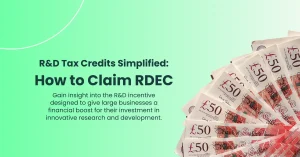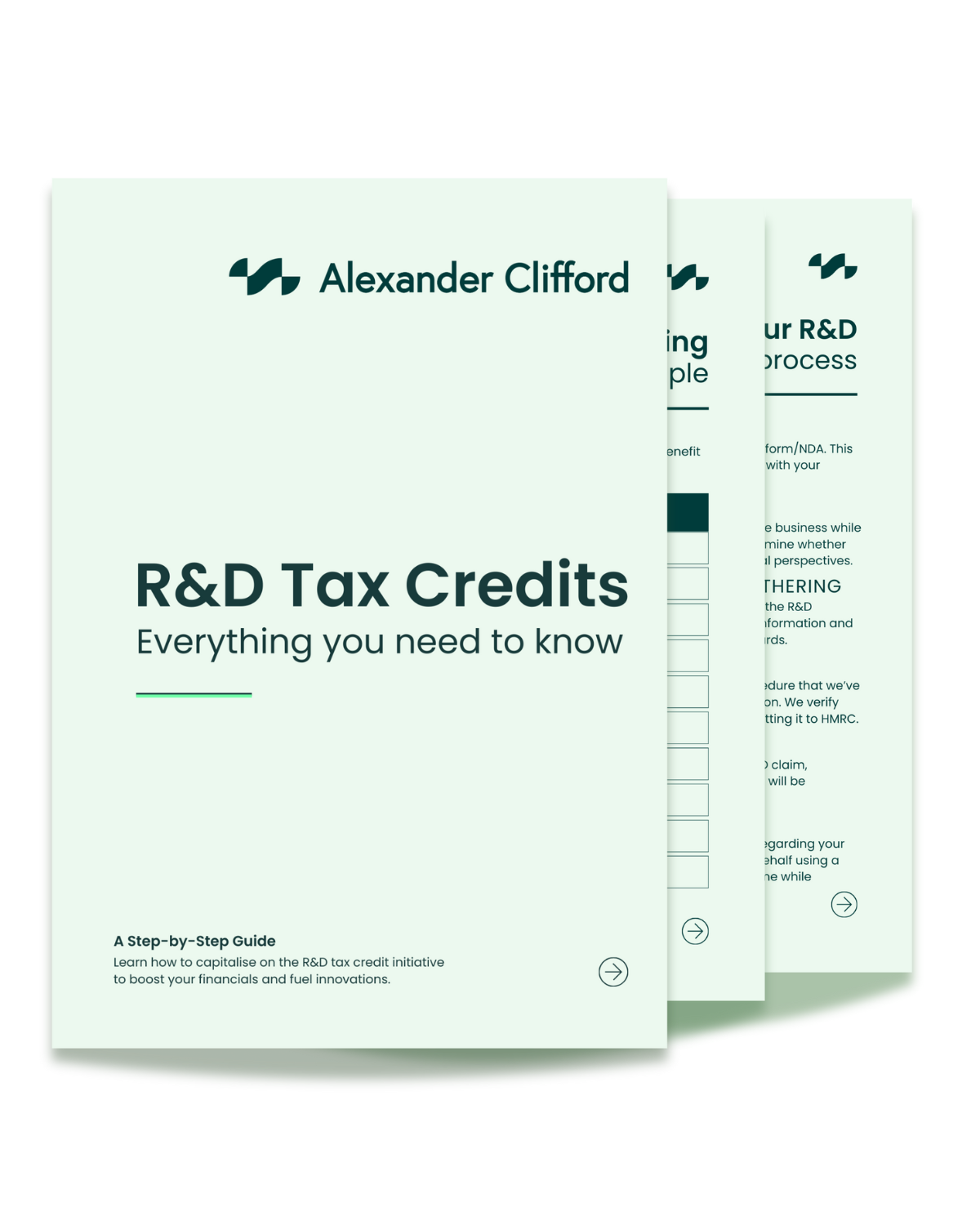HMRC Compliance Check Guide: How to Avoid Tax Enquiries and Stay Compliant

It can be both confusing and frustrating that your R&D tax credit claim is undergoing a compliance check after going through an often complex claiming process. You’ve worked out how much you could retrieve from R&D tax credits but for some reason, HMRC are delaying sending you this money. This article will define what is a compliance check, and the steps you need to take to appropriately respond to it. Check out our latest blog: HMRC Compliance Check 2025
What is an HMRC compliance check for R&D tax credits?
HMRC will make an enquiry into your R&D claim to ensure that companies claiming Research and Development (R&D) tax credits have complied with the eligibility criteria and accurately reported their qualifying R&D activities and expenses. The purpose is to verify the legitimacy of the claims to ensure adherence to tax regulations and prevent abuse of the scheme.
Book a quick call back
What triggers an HMRC compliance check?
HMRC have really cracked down on fraud in claiming R&D tax credits, and as part of their processes, they’re carrying out regular random checks of claims they receive. There are certain industries that are considered higher risk due to the nature of their activities, and so claims from these industries are more likely to be subjected to a compliance check. This means that even if your claim is perfect, without a single error, you may still receive an enquiry. Other reasons why you may receive a compliance check for a retrospective or current R&D claim are:
Incorrect cost allocation
If there are errors in allocating costs to eligible R&D activities, HMRC may conduct a compliance check to ensure accurate and justified cost claims. They’ll be looking to see if the figures in your additional information form mirror your corporate accounts. When calculating R&D tax credits, our R&D calculator can guide you through this.
Including some ineligible expenditure
Claims that include costs not considered eligible for R&D tax credits may trigger a compliance check to verify the appropriateness of the claimed expenditures. Common ineligible expenses that people mistakenly include in their R&D claims are routine business expenses, costs for advertising and the price involved in changing the aesthetics of a product. Eligible R&D costs cover actual research and development where you’re carrying out your project without fully knowing if it can be a success.
Inadequate documentation
Following recordkeeping best practices is fundamental to the entire R&D claiming process. If your claim doesn’t include sufficient justification of your costs or how you carried out your R&D activities, HMRC will want to find out more before sending you the R&D tax credits. We recommend that you follow the 6 types of R&D tax credit documentation.
A large claim
Your R&D claim may be investigated if the amount you are claiming is significantly higher than what you’ve claimed before. HMRC will want to see if you’ve made a mistake which is why we recommend you acknowledge in your claim that there has been an increase and you can explain why.
HMRC compliance check letter a.k.a enquiry letter?
You will receive an enquiry letter stating that your R&D claim is under review. If you are using an accountant or tax specialist, they will receive the notification on your behalf and will let you know. This notification will inform you of the general process of a compliance check, an explanation of why they carry out checks, and some questions for you to answer. You’ll have 30 days to respond to this with answered questions and evidence to accompany this.
Once your answers have been reviewed, HMRC will close the enquiry or send you more questions. Additional enquiries may be conducted through a meeting either in-person or online where a tax inspector will examine your claim with opportunities for you to provide specific examinations.
The best way to deal with a compliance check is by utilising support from an R&D tax credit specialist. Their expertise ensures accurate claim presentation and effective communication with tax authorities, maximising the chances of a favourable outcome.
What if I don’t agree with the outcome of the compliance check?
Should you disagree with the outcome, you have the option to appeal the decision, requesting another opportunity to present your case. Alternatively, you can choose to accept the conclusion. The duration of the process is influenced by factors such as the timeliness of your responses and the decision you opt to accept.
What are the penalties of an HMRC compliance check?
Penalties resulting from an HMRC compliance check can include fines for understated tax liabilities, failure to notify HMRC, late filing or payment, deliberate withholding of information, and, in severe cases, criminal prosecution. These penalties will be imposed once the enquiry has been resolved. The severity of penalties depends on the nature and intent of the non-compliance. Seeking professional guidance and maintaining transparent communication with HMRC during a compliance check is essential to address and potentially mitigate penalties.
How to avoid an HMRC compliance check?
Due to clear reasons, HMRC does not disclose its risk criteria, and HMRC caseworkers have the flexibility to exercise discretion in determining whether to initiate a compliance check. From our experience in producing thousands of R&D claims, following these best practices keeps your next claim strong and compliant.
While it’s not possible to entirely avoid an HMRC compliance check, implementing the following best practices can help reduce the likelihood and ensure a smoother process for an R&D tax credit claim:
Supporting documentation
Maintain comprehensive and well-organised documentation supporting your R&D claim, including project records, financial documents, and any relevant technical details.
Adherence to guidelines
Ensure strict adherence to HMRC guidelines for R&D tax credits, verifying that your R&D tax credit claim meets all eligibility criteria and statutory requirements.
Transparent communication
Clearly communicate the nature of your R&D activities and the associated costs in your claim, leaving no room for ambiguity or misinterpretation.
Professional advice
Seek guidance from R&D tax credit specialists or tax advisors to ensure that your claim is correctly prepared and aligns with HMRC requirements.
Regular training and updates
Stay informed about any changes in R&D tax credit regulations and guidelines to ensure ongoing compliance with the latest requirements.
Provide timely responses
Respond promptly to any queries or requests for information from HMRC during the assessment process to demonstrate cooperation and transparency.
Remember, while these practices can help reduce the risk of a compliance check and ensure a smoother process, it’s essential to be prepared for potential reviews. Following best practices enhances the accuracy and legitimacy of your R&D claim, ultimately increasing the likelihood of a favourable outcome during HMRC assessments.
In conclusion
Overall, an HMRC compliance check can’t always be avoided and it can be a frustrating process. You need to keep in mind the potential triggers for an enquiry while finalising your R&D claim. Engaging an R&D tax credit specialist is highly recommended for effective communication and increased chances of a favourable outcome. To minimise the risk of a compliance check from HMRC, adhering to best practices such as maintaining thorough documentation and providing timely responses is essential, enhancing the legitimacy of your R&D claim during HMRC assessments.
How does Alexander Clifford help with compliance checks?
The specialist team at Alexander Clifford deeply understands the R&D claiming process including how to effectively manage an HMRC compliance check. While we can’t guarantee that we will prevent an enquiry from HMRC due to their random selection, our in-house processes offer a thorough and detailed approach to managing your enquiry so it’s handled in a timely manner with minimised stress. By letting our experts be responsible for your claim, you can rest assured that your entitlement is maximised with unlimited access to our advice. Contact us today to know exactly how we can support you.







